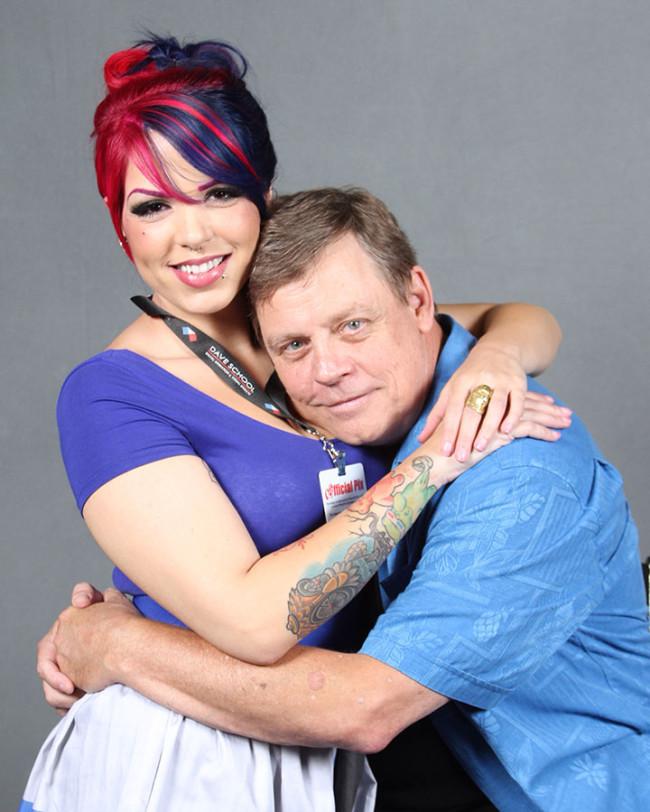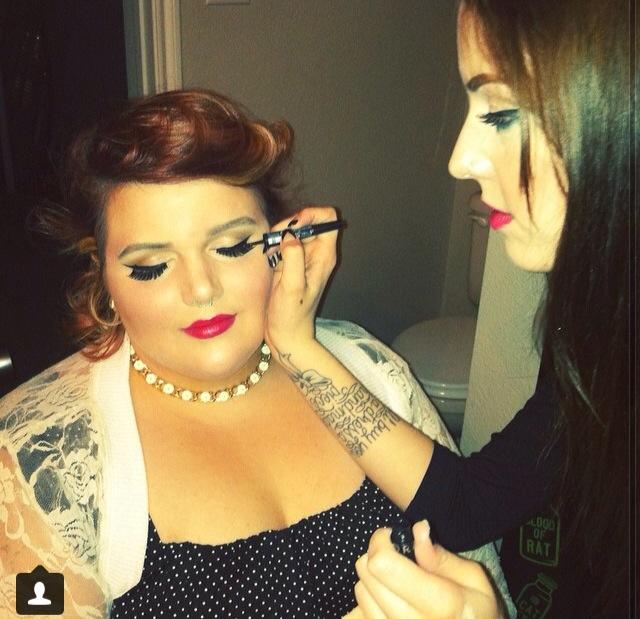
Taking a peek behind the curtain of a job not so often talked about, make-up artistry, shows there is much more to the job than meets the eye. Making it in the world of make-up requires skill, education, precision and passion. Many make-up artist hopefuls begin with a dream, but get chewed up and spit out after realizing just how serious this industry is. Most important for the make-up artists who do make it is maintaining a true love for what they do, so that their hard, sometimes grueling, work never really feels like work.

Any given weekend for Marlene Barbie of Orlando, for instance, could include standing about six inches from the faces of Sylvester Stallone, Carrie Fischer, William Shatner, or Mark Hamill. Being a celebrity make-up artist, as well as an employee at MAC Cosmetics, keeps the pink and blue haired beauty hard at work.
Barbie’s love of make-up began around the age of 13, when she started doing the faces of cast members in her musical theatre class.
“I kind of fell into it and fell in love with it,” says Barbie, now 28. She has been a make-up artist for 11 years, with a number of impressive notches on her belt. She is a ten-year MAC veteran, and has worked with over 150 celebrities.
Kim Parks of Dallas, 22, gained her love for make-up at a young age, too. At only 12 years old, Parks and her sister were experimenting with their mother’s make-up. Fast forward ten years and the 22-year-old is senior education consultant at a Sephora inside JCPenney in Dallas. She previously worked for MAC cosmetics, and is entirely self-taught in make-up application.

When it came to choosing a path in life, Parks’ love for make-up was evident, but she never thought she’d be doing it as a career. She started at the cosmetic superstore, Ulta, then moved on to MAC, and finally, Sephora.
Barbie promised herself a 9 to 5 job wouldn’t be her route. What was important to her was to find something that made her happy, regardless of other factors.
“A job choice in life is difficult. You want to be practical and be able to support yourself, but then I can’t see myself ever doing something mundane or that I hate to do just for a paycheck,” she said.
Barbia is often asked to work conventions. A typical convention day means waking up around 5 a.m. She makes herself presentable because “I am what I sell.” Starting at 6:30 a.m. she starts doing celebrity room calls, and there are always multiple. After that, she makes it to the convention by the time it opens and sets up her counter. She does touch ups for celebrities directly before their photo ops. Touch ups continue throughout the day, and after the last celebrity shoots, she packs up. Typical days at conventions can last 14 hours or longer.
Often, make-up application is viewed as overpriced, and some believe being a make-up artist is a high paid job.
“The biggest challenge in my career probably goes along with the misconception that we make a lot of money,” Barbie says. “People think it’s overpriced, but it’s a service. Just like you get your hair done, you get your nails done, all that stuff. It’s a service. It’s my job.”
Makeovers vary from artist to artist, but Barbie charges $75 for full-face. If you’re wanting airbrush makeup or any special FX, that will cost you extra. However, for students, Barbie only charges $45. Parks charges $50 for full-face makeup, and a little more for bridal. Makeup artists can be found behind the counter at places like Sephora or MAC, or many freelance and can come directly to the customer.
Meredith Rodgers, a sophomore at University of North Texas, 19, has loved make-up as long as she can remember. Her plans next semester include going to beauty school to study a craft she has spent her life perfecting. But while she has never been unsure of her dreams, her parents have.
“I told my mom and dad that I was going to beauty school instead of college, specifically to do make-up. My mom warned me that it’s risky and my dad was telling me that wasn’t a ‘real’ job.”
Parks has received similar feedback about being a make-up artist. “I feel like some people think it’s ‘just makeup’, like it isn’t a serious career, and it really is!”
When it comes down to the men and women who do decide to make a career out of make-up, what is important are the benefits that come with the job, like changing someone’s appearance in a positive way.
“I know I’ve done a good job when someone feels beautiful. It’s more gratifying for me,” Barbie says.
Parks agrees, “I love transforming someone’s face. I help girls who have such low self-esteem,” she said. “Just being able to make them feel special and making the client laugh and feel comfortable is always my goal.”
In order to make it successfully in the industry, make-up artists must constantly evolve and grow. Learning new techniques, discovering the latest trends, and attending classes are vital in staying at the top of the game.
“I love it, I’m always challenged,” Barbie says. “I’m always learning. There’s nothing stagnant about what I do. Like there’s constantly a need to learn. It never gets boring.”
From her own experience, Rodgers agrees. “Make-up trends are always changing, there will always be something new to learn,” she said. “And with trends totally aside, the most important thing is talking to the person getting make-up applied, see what they want and need.”
According to Parks, that’s just the trick. “I feel like make-up artists that really get in there and read the client really well are always successful.”
Even being two make-up artists most anyone would consider successful in their field, both Parks and Barbie still have future goals and dreams. “My next step? I want to create a make-up line eventually,” Barbie says. “Nothing big, like full sha-bang, unless it leads up to that, just, like, eyeshadows and things I know how to make easily and well, so it’s a good product.” She also hopes to get more practice in special FX make-up and prosthetics, like the makeup applied in movies. Parks similarly wants to start experimenting with special FX, as well as continue her career at Sephora and more freelancing and bridal make-up.
Some advice for those who plan to stay on the receiving end of the make-up brush: “Make-up is not about looking like someone else,” Barbie says. “My biggest pet peeve is when people say ‘I want to look like Kim Kardashian!’ Well, you have your face and she has her face. There’s only so much I can do. What I can do is take your face and emphasis your beauty. It’s finding what makes you, and your unique features, beautiful.”
Most important of all? According to Parks, “I just wish women would be more confident in their own skin and just be proud of who you are and who you’re going to be!”
Hayley Harrison is a 22-year-old, first semester senior at SMU. She is a journalism major and fashion media and English minor. She can be reached at 214.403.4744 and hwharrison@smu.edu with questions or comments.








